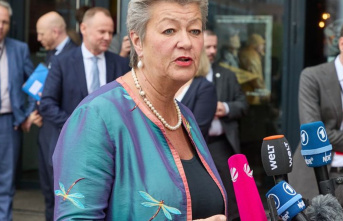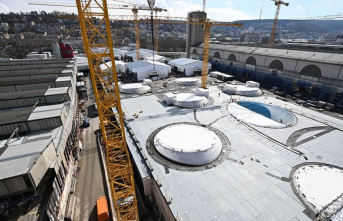The Bank of Spain warned Tuesday that the possible interruption of Russian imports of energy raw material could have a significant impact on Spain's economy. This would result in a decrease in GDP of 0.8% to 1.4%, and an increase of inflation of between 0.8 percent and 1.2 percentage points over the first year.
In the report "Economic consequences of hypothetical trade closure between Russia, the European Union", this is clearly stated. The scenario most likely to the Bank of Spain would see a 1.1% decrease in GDP and an increase of inflation of 0.9 percentage point. The forecasts of the supervisor have been reduced to 4.5%, and its estimates of inflation for the entire year are at 7.5%.
Pablo Hernandez, the head of the group, warned that "The difficulty in replacing those products in the near term would mean a decrease in the energy supply, and a worsening current inflationary episode which would indicate, in both cases, a burden upon economic activity." The report also includes Cos.
The Bank of Spain stressed that, given Spain's lower dependence on Russian energy than the rest of Europe, the economic effects would be much smaller. He pointed out that the impact on other European economies would be between 1.9% to 3.4% for Germany, 1.2% to 2% for France and 2.3% to 3.9% for Italy. The EU would experience an increase in inflation of 1.6 to 2.7 points and between 2.5% to 4.2% of its GDP. The agency stated that these values should not be considered short-term and would decrease as Russian energy import substitutions increase.
Import restrictions on Russia's energy raw materials could have the most impact on prices and activity in the European economies.
The impact will be different for each country in the European Union (EU), depending on how dependent they are on Russia. Russia imports around 18% of the energy mining products (gas, coal) and 9% the oil products used in the EU, as opposed to 3% and 2.5% in Spain.
But, if imports were stopped only for energy mining (which is both coal and natural gas), then the impact would be more than if they were stopped for petroleum products. The approximate proportions of the total effects would be 70% and 30%, respectively.
The most affected sectors are those that use more energy, like transport and the basic metals industries. However, service sectors such as real estate would not be as affected. The direct effect of higher energy prices on each sector is not the only reason for the reduction in added value, but the propagation of these effects through the production chain.
The increase in costs in certain sectors that play a key role in production chains such as transport or chemical will have an impact on the rest of the branches regardless of their energy intensity.
The Bank of Spain also points out that certain sectors of Spain's economy, like vehicle manufacturing and pharmaceutical production, are highly dependent on suppliers and customers located in other EU countries. These sectors could be exposed indirectly to production restrictions in other countries because of energy restrictions.
In the hypothetical total cessation in trade flows between Russia, Europe, and Spain, the impact on Spanish GDP will be -1.8%. It would mean that there would be an additional fall in GDP of 0.7 points relative to the central scenario of no energy imports (1.1%).
Joan Batalla (President of Sedigas, Spanish Gas Association) has stated that gas supplies are "guaranteed" for next year due to the "diversification” of the Spanish system. Battle's comments come only hours after the European Union decided to partially veto Russian crude oil imports at year's end in retaliation to the Russian invasion. They also came before negotiations with the community partners to address the same veto in case of gas, which Europe is 40% dependent on Russia.
This Tuesday's meeting of the head of the gas organization will be held in Madrid. He recalled that Spain has a "modern and resilient infrastructure" as well as a wide variety of suppliers. These include countries other than Russia, where Spain imported only 8% last year. In particular, gas is now arriving from 14 countries via six active regasification units, which account for 25% of all European gas supplies.
Spain also holds a third share of Europe's storage reserves. The system currently has 66% of its available capacity at the gates to summer, which is a stage with lower gas consumption. The EU recommends that winter storage be at least 80%, which is a number Joan Batalla says will be achievable in Spain despite the impact of the conflict in Ukraine on the energy sector.
Prices are not the same. Sedigas' president has confirmed that the international average gas price will remain at 70 euros/MWh for the rest of 2022. This figure is clearly lower than March's maximum of 210 euros/MWh. However, it will surpass the 2021 reference when it moved between 40 and 50 euro/MWh. Spain had proposed a limit. Portugal to Brussels.
Sedigas is determined to apply "the European regulations not yet in effect", such as the reduction in taxes in relation to VAT and the Tax on Hydrocarbons, in the face of this rising cost. The electricity bill in the first instance has fallen from 21% down to 10% since June last year. Joan Batalla insists that the EU should still support the price limit for gas. However, this must be done to ensure "Iberian exceptionity". He refers to combined cycle plants which make up 16% of all electricity, but are vital for supply security. Battle said that this is not about aiding or subsidizing, but about compensating "real costs" in a country with no natural gas resources.
Sedigas also cites long-term structural measures such as the commitment for renewable gases to make Spain "a renewable gas hub at European levels". Battle acknowledged that the existing networks could be used to produce this renewable product in future. However, he stressed the need for stronger interconnections with EU.












